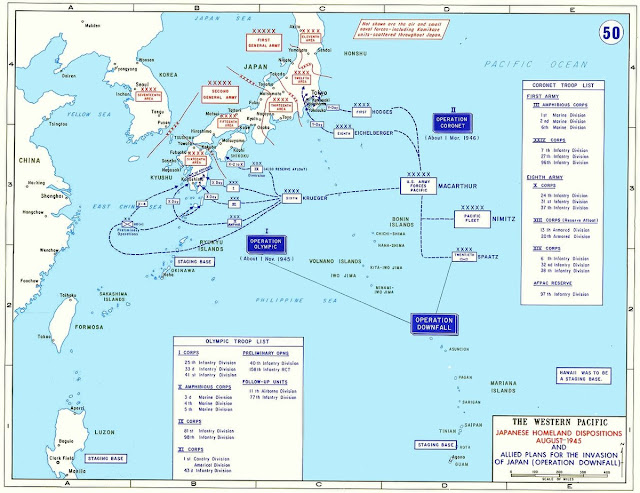Talking About World War II: Did the atomic bomb really have to be dropped, as U.S history books state?
On Quora, the debate over whether the U.S. should have sought other ways to end the Pacific War instead of dropping atomic bombs on Japan continues.
Yesterday, I replied to this question by James Germain:
Did the atomic bomb really have to be dropped as U.S history books state?
It’s not just “U.S. history books” that state the necessity for the use of atomic weapons against Japan; many Japanese historians also say the same thing.
Now that we’ve got the “handwringing over the bomb” part out of the way, let’s consider the alternatives that were available to President Harry S Truman, Fleet Admiral Chester W. Nimitz, and General of the Army Douglas MacArthur:
Before President Truman decided to use atomic weapons to shock the Japanese militarists into accepting the Potsdam Declaration and agreeing to surrender unconditionally (with, perhaps, private guarantees that the Emperor could retain his position as a ceremonial head of state), he had several alternatives, none of which was more palatable to either side:
- The U.S.-led Allied powers could tighten an already-in-place blockade of the Japanese islands by mining all of the remaining sea lanes, including the Inland Sea. This would cut off Japan and its population from badly-needed raw materials (such as oil, manganese, metal ores, and agricultural products) from what remained of the Empire. Operation “Starvation,” as this plan was code-named, would have resulted in the deaths of untold millions due to the effects of malnutrition, lack of medical supplies, and lack of available housing
- The conventional bombing of Japan’s already battered cities, except maybe the old Imperial capital of Kyoto, would continue
- Operation Olympic, the planned invasion of Kyushu, would begin on or around November 1, 1945. The objective of Olympic, which was only Act I of Operation Downfall, was not intended to take the entire southernmost of the Home Islands, but rather just a third of its total area. Olympic had two goals: First, it was intended to reduce the number of Japanese defenders in a grinding battle of attrition and prevent troops based on Kyushu to reinforce the defenses on Honshu, especially in and around the Kanto Plain near Tokyo. Second, the American and Commonwealth forces would have several new air bases (especially around Miyazaki) and excellent anchorages (near Ariake and Kagoshima Bays) that would serve as staging areas for Operation Coronet
- In March of 1946, Operation Coronet, the last major amphibious landing of World War II, would have been carried out if the Japanese Supreme War Council still had not accepted the Allied terms for surrender. The invasion forces would have included units from the Pacific-based Eighth Army and the transferred-from-Europe First Army, as well as a large floating reserve. Coronet would have been countered by the Japanese’s own Ketsu-Go, which anticipated a U.S. landing near the Kanto Plain on the Boso Peninsula and an advance against the capital, Tokyo.
Keep in mind that unlike the U.S. and Great Britain, the Japanese government was not a democracy and therefore what the average civilian did or did not want was irrelevant. Like all totalitarian states, the militarists controlled the media, the means of production, the educational system, and its propaganda drowned out any news that came from the outside world. So if the Imperial Supreme War Council, which at the time of Hiroshima and Nagasaki was still divided 3–3 on the issue of surrender, called on the Japanese people to fight on the name of the Emperor, the average Japanese man, woman, and child would have obeyed blindly.
It has become an article of faith in the minds of many people, especially in the United States, that Japan was going to surrender anyway and that the use of nuclear weapons was not justified. This is not so; the actual historical record (and not the carefully parsed material used by both liberals and conservatives who cling to the fantasy that Japan was willing to give up before Hiroshima and Nagasaki) shows that it wasn’t until Tokyo got the twin blows of the A-bomb attacks and the Soviet Union’s entry into the Pacific War that Emperor Hirohito decided to end the 3–3 deadlock in the Imperial Supreme War Council and cast his vote for peace.



.jpg)
Comments
Post a Comment